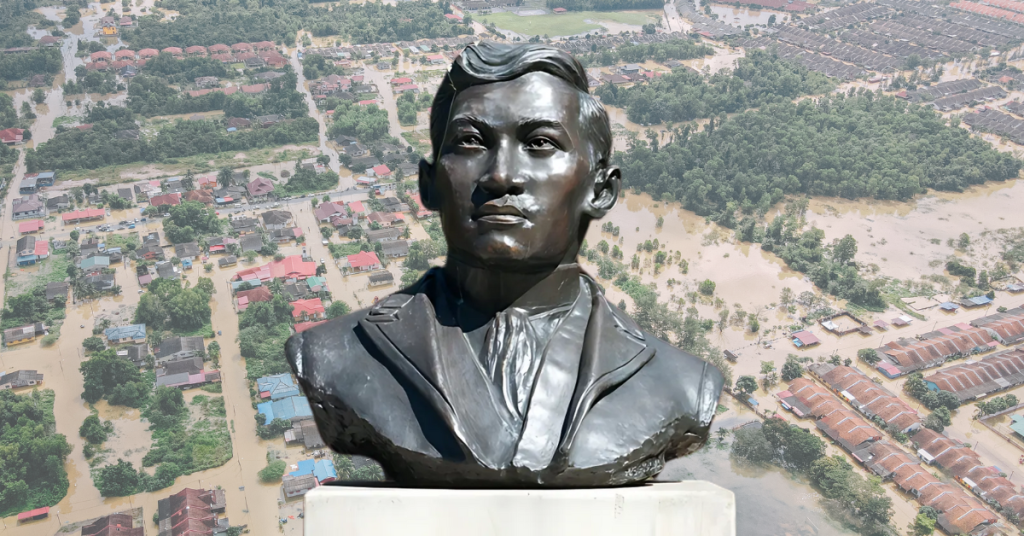Floods once again paralyzed large parts of Metro Manila this year. Billions of pesos were allocated to flood control, drainage systems, and pumping stations—yet commuters waded through waist-deep waters, businesses halted operations, and families lost property.
For many Filipinos, the question is the same: Where did all the money go?
Allegations of overpricing, ghost projects, and padded budgets have dogged flood-control spending for decades. And while these feel like problems unique to modern politics, they are not new at all. More than a century ago, Jose Rizal himself denounced the same corruption in Spanish-era public works.
Rizal saw with his own eyes how roads, bridges, and drainage projects were used as tools for enrichment by officials, leaving Filipinos overtaxed and underserved. His writings show that the same issues we complain about today—substandard works, inflated costs, and projects that collapse after one rainy season—were already happening in the 19th century.
Zapote Bridge: A Colonial Case Study in Overpricing
One of the starkest examples was the Zapote Bridge in Cavite, built in the mid-19th century. On paper, it was constructed at a high cost with supposedly durable materials. In practice, it collapsed several times within a short span of years.
Historian Teodoro Agoncillo (History of the Filipino People, 1960) cited the scandal as a classic case of corruption in procurement and construction. Spanish officials and local contractors inflated costs, pocketed profits, and left Filipinos with a bridge unfit for use.
The parallels with today’s overpriced bridges and road projects are obvious. Over a hundred years later, the same practices still leave taxpayers footing the bill for poor quality.
Intramuros Drainage: Money Spent, Floods Unsolved
Metro Manila’s flooding woes today would be familiar to Rizal. In the 1870s and 1880s, Intramuros and its surrounding districts were notorious for poor drainage. Colonial records show large sums were allocated repeatedly for road repairs and drainage improvements, yet nothing changed.
In La Solidaridad (1889), Rizal criticized this pattern bluntly: “The expenses are great, the projects many, but where are the results?”
The reality was simple: money went into the pockets of colonial officials and contractors, not into lasting solutions. The people waded through floods then, just as they do now.
Barracks and Provincial Roads Built on Sand
The rot wasn’t limited to Manila. Historian John Schumacher, S.J. (Readings in Philippine History, 1973) documented how military barracks and provincial roads were plagued by the same corruption.
Filipinos were forced into polo y servicio (forced labor) or paid cash to avoid it, while taxes funded “infrastructure” that often washed away after one rainy season. Substandard materials, poor planning, and inflated budgets were the norm.
Rizal, who traveled extensively across the country, would have seen how such corruption not only wasted money but also hindered trade, education, and social mobility.
The Manila–Dagupan Railway: Progress at a Price
Not all projects were outright failures. The Manila–Dagupan Railway, completed in 1891, was hailed as modern progress. But behind the scenes, Spanish officials still lined their pockets.
Historian O.D. Corpuz (The Roots of the Filipino Nation, 1989) notes that while a British company handled the project, colonial authorities inflated procurement and land costs. The railway ran—but Filipinos paid far more than necessary.
It’s the same story we hear today when international contractors build infrastructure while local officials allegedly pad the bills.
Rizal’s Warning in El Filibusterismo
Rizal turned these frustrations into fiction. In El Filibusterismo (1891), the character Simoun exploits corrupt officials by selling them wasteful schemes that they approve without question. It was satire, but it reflected real life: a government so riddled with graft that progress was always an illusion.
He warned that corruption wasn’t just theft. It was a betrayal of national progress, leaving Filipinos with crumbling infrastructure despite paying the highest taxes in Asia at the time.
Why This Still Matters
Fast-forward to today, and Rizal’s words still sting. Every time a drainage project fails to prevent floods or a bridge cracks after a typhoon, Filipinos see the same pattern he condemned: money spent, little to show.
Three lessons stand out:
- Bad infrastructure weakens growth. Just as broken colonial roads stunted trade, today’s floods shut down businesses, cost jobs, and endanger lives.
- Overpricing hurts the poor most. Taxes, loans, and higher costs are passed down to ordinary families, while a few profit.
- History repeats when we forget. From Zapote Bridge to today’s overpriced flood-control projects, corruption thrives when citizens stop asking hard questions.
Lessons for Entrepreneurs and Investors
For entrepreneurs and investors reading this, Rizal’s insights go beyond history. They’re warnings about accountability and long-term vision.
- Quality is non-negotiable. A business that cuts corners to save costs eventually loses trust. Colonial bridges collapsed quickly; today’s equivalent is a brand or project that fails because it was built on shortcuts.
- Transparency builds resilience. Rizal argued that societies must invest in honesty to prosper. The same applies to businesses. Hidden costs and shady practices might bring short-term gains but destroy long-term value.
- Sustainability is survival. Infrastructure—and businesses—must be designed to last. Rizal’s critique of wasteful colonial projects mirrors how modern companies must focus on building for durability, not just speed.
Rizal’s Timeless Call
In one of his essays, Rizal asked: “What use is a project if it exists only on paper, when the people suffer still?”
It’s a question Filipinos can still ask today, whenever floodwaters rise or a new scandal breaks.
The takeaway? Corruption in public works doesn’t just waste money. It steals opportunities, erodes trust, and traps generations in the same problems. Rizal saw it in his time, and sadly, we still see it now.
If we truly want progress, we need to ensure every peso builds something real, lasting, and worthy of the people who pay for it
![]()



